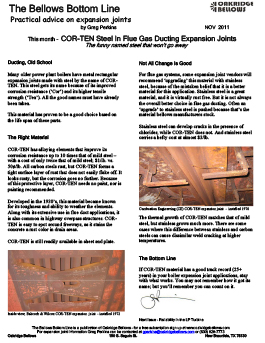Cor-Ten – The forgotten steel

COR-TEN Steel In Flue Gas Ducting Expansion Joints
The funny named steel that won’t go away.
Ducting, Old School Many older power plant boilers have metal rectangular expansion joints made with steel by the name of CORTEN.
This steel gets its name because of its improved corrosion resistance (‘Cor’) and its higher tensile strength (‘Ten’). All the good names must have already been taken.
This material has proven to be a good choice based on the life span of these parts. The Right Material COR-TEN has alloying elements that improve its corrosion resistance up to 10 times that of mild steel – with a cost of only twice that of mild steel; $1/lb. vs. 50¢/lb. All carbon steels rust, but COR-TEN forms a tight surface layer of rust that does not easily flake off. It looks rusty, but the corrosion goes no further. Because of this protective layer, COR-TEN needs no paint, nor is painting recommended.
Developed in the 1930’s, this material became known for its toughness and ability to weather the elements. Along with its extensive use in flue duct applications, it is also common in highway overpass structures. CORTEN is easy to spot around freeways, as it stains the concrete a rust color in drain areas.
COR-TEN is still readily available in sheet and plate.
Inside view, Babcock & Wilcox COR-TEN expansion joint – installed 1972 Not All Change Is Good For flue gas systems, some expansion joint vendors will recommend ‘upgrading’ this material with stainless steel, because of the mistaken belief that it is a better material for this application. Stainless steel is a great material, and it is virtually rust free. But it is not always the overall better choice in flue gas ducting. Often an ‘upgrade’ to stainless steel is pushed because that’s the material bellows manufacturers stock.
Stainless steel can develop cracks in the presence of chlorides, while COR-TEN does not. And stainless steel carries a hefty cost at almost $3/lb. Combustion Engineering (CE) COR-TEN expansion joint – installed 1976 The thermal growth of COR-TEN matches that of mild steel, but stainless grows much more. There are some cases where this difference between stainless and carbon steels can cause dissimilar weld cracking at higher temperatures.
The Bottom Line
If COR-TEN material has a good track record (25+ years) in your boiler expansion joint applications, stay with what works. You may not remember how it got its name; but you’ll remember you can count on it.


